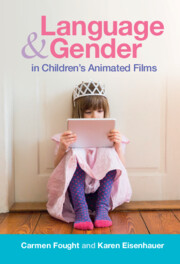Book contents
- Language and Gender in Children’s Animated Films
- Language and Gender in Children’s Animated Films
- Copyright page
- Dedication
- Contents
- Figures
- Tables
- Preface
- Acknowledgments
- 1 Introduction
- 2 Gender, Disney, and Pixar in Historical Context
- 3 Representation, Speech Amounts, and Talkativeness
- 4 Compliments
- 5 Directives
- 6 Insults
- 7 Apologies
- 8 Representing Queerness
- 9 Conclusion
- References and Filmography
- Index
6 - Insults
Published online by Cambridge University Press: 01 September 2022
- Language and Gender in Children’s Animated Films
- Language and Gender in Children’s Animated Films
- Copyright page
- Dedication
- Contents
- Figures
- Tables
- Preface
- Acknowledgments
- 1 Introduction
- 2 Gender, Disney, and Pixar in Historical Context
- 3 Representation, Speech Amounts, and Talkativeness
- 4 Compliments
- 5 Directives
- 6 Insults
- 7 Apologies
- 8 Representing Queerness
- 9 Conclusion
- References and Filmography
- Index
Summary
This chapter focuses on the performance of impoliteness, through the lens of insults and other mocking language. Impoliteness has been documented as a tool men use to perform masculinity and bond with other men. Disney and Pixar films reflect this practice by portraying insults as associated naturally with masculinity, and often frame insults between men as silly and rapport-building. Female characters insulting others isn’t typically seen as “funny” in Disney, with some clear exceptions, including older characters (highlighting the “sassy old lady” trope). There is also some evidence that the more recent characters of color have more impolite utterances, suggesting that women of color are also an ideological exception to polite femininity. Discourses of masculinity in Disney and Pixar sanction insults as an expression of emotion, but portray more straightforward forms of affection as less common and/or less desirable. For femininity, the opposite discourse is upheld: polite forms are framed as natural, or desirable ways to express feeling, but insults have negative consequences.
Keywords
- Type
- Chapter
- Information
- Language and Gender in Children's Animated FilmsExploring Disney and Pixar, pp. 131 - 154Publisher: Cambridge University PressPrint publication year: 2022

